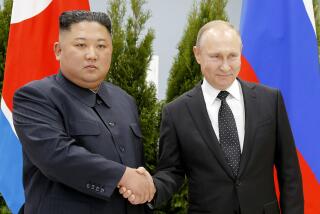Talking With N. Korea: It’s Worth a Try
- Share via
This week, the foreign ministers from more than 20 nations, including the United States, will gather in Brunei to discuss security issues in the Asia-Pacific region. But an informal meeting there between U.S. Secretary of State Colin L. Powell and North Korean Foreign Minister Paek Nam Sun may prove more important. If it happens, it will be the first bilateral contact by high-level officials of the U.S. and North Korea in nearly two years.
Unfortunately, if recent history is any guide, this overture between the U.S. and North Korea will probably be another round of a cat-and-mouse game in which the North offers, then retracts, promises to revive talks.
Only last month, the North opened fire on two South Korean patrol boats, killing five sailors. The Bush administration four days later withdrew an offer to resume talks with Pyongyang. Indeed, there is no guarantee that Paek will even show up in Brunei.
The basic conflicts between the two nations remain immense: curbing North Korea’s military aspirations by, among other things, inducing it to cut back its nuclear weapons program; improving relations between the two Koreas; and taking tentative steps toward rapprochement between the U.S. and North Korea.
There has been much carping from critics about the administration’s so-called hard-line policy toward North Korea. For example, Wendy Sherman, Bill Clinton’s point person on North Korea, recently said, “We are at risk of losing any momentum for change we might have once had and turning cloudy skies into a fierce storm.”
Such critics claim that President Bush has forced Pyongyang into a corner and that the administration has undermined the South’s engagement efforts with the North.
They argue that the Bush administration’s stance of resolving all items on the negotiating table--including weapons of mass destruction and missile proliferation, conventional arms reduction, human rights and inspections of nuclear facilities--is unrealistically burdensome. And there were howls of protest when Bush singled out North Korea (along with Iraq and Iran) as part of an “axis of evil.”
However, the Bush policy toward North Korea, centering on the principles of verifiability and reciprocity, is more comprehensive, more complex, more nuanced--and potentially more effective--than critics acknowledge.
Administration officials have suggested that the U.S. will be more flexible in reaching agreement on agenda items. As early as June 2001, the administration spearheaded a diplomatic initiative to bring the North back to the negotiating table, with the president declaring that Washington was ready to talk “any time, anyplace, without preconditions.”
During his visit to South Korea in February, Bush reiterated his support for Seoul’s “sunshine policy,” the effort intended to bring about reconciliation with the North. Further, the U.S. has continued to deliver food aid to the North. Yet the administration also is aware that conciliatory gestures have their limits.
Pyongyang still refuses to allow inspectors from the International Atomic Energy Agency into the country to make a full accounting of its past nuclear activities. Even with its economy a shambles, North Korea spends 25% of its gross national product on defense. This while its health system has collapsed and millions of its people face starvation and death.
North Korea remains fundamentally what it has been: erratic, hostile and dangerous, as well as a threat to South Korea and Japan.
So should Powell even bother to meet with Paek in Brunei? It’s worth a try.
Pyongyang on Thursday belatedly broadcast a message to South Korea expressing “regret” for last month’s naval clash, and it proposed resuming a dialogue with Seoul. A small gesture, but one that could augur well for a meeting between Powell and Paek.
As Winston Churchill said in 1954, “To jaw-jaw is always better than to war-war.”
With Pyongyang, one can only hope.
*
Seongho Sheen and Toshi Yoshihara are research fellows at the Institute for Foreign Policy Analysis, which is affiliated with the Fletcher School at Tufts University.
More to Read
Sign up for Essential California
The most important California stories and recommendations in your inbox every morning.
You may occasionally receive promotional content from the Los Angeles Times.













